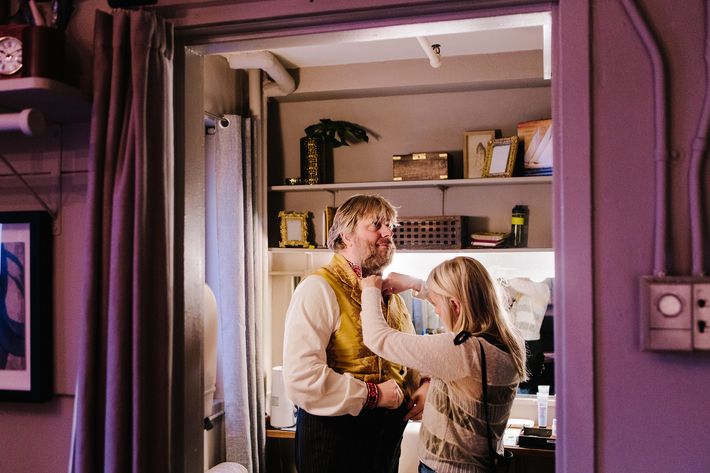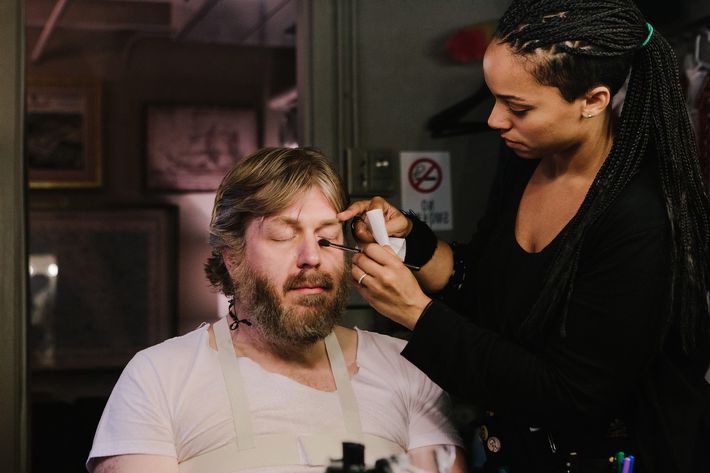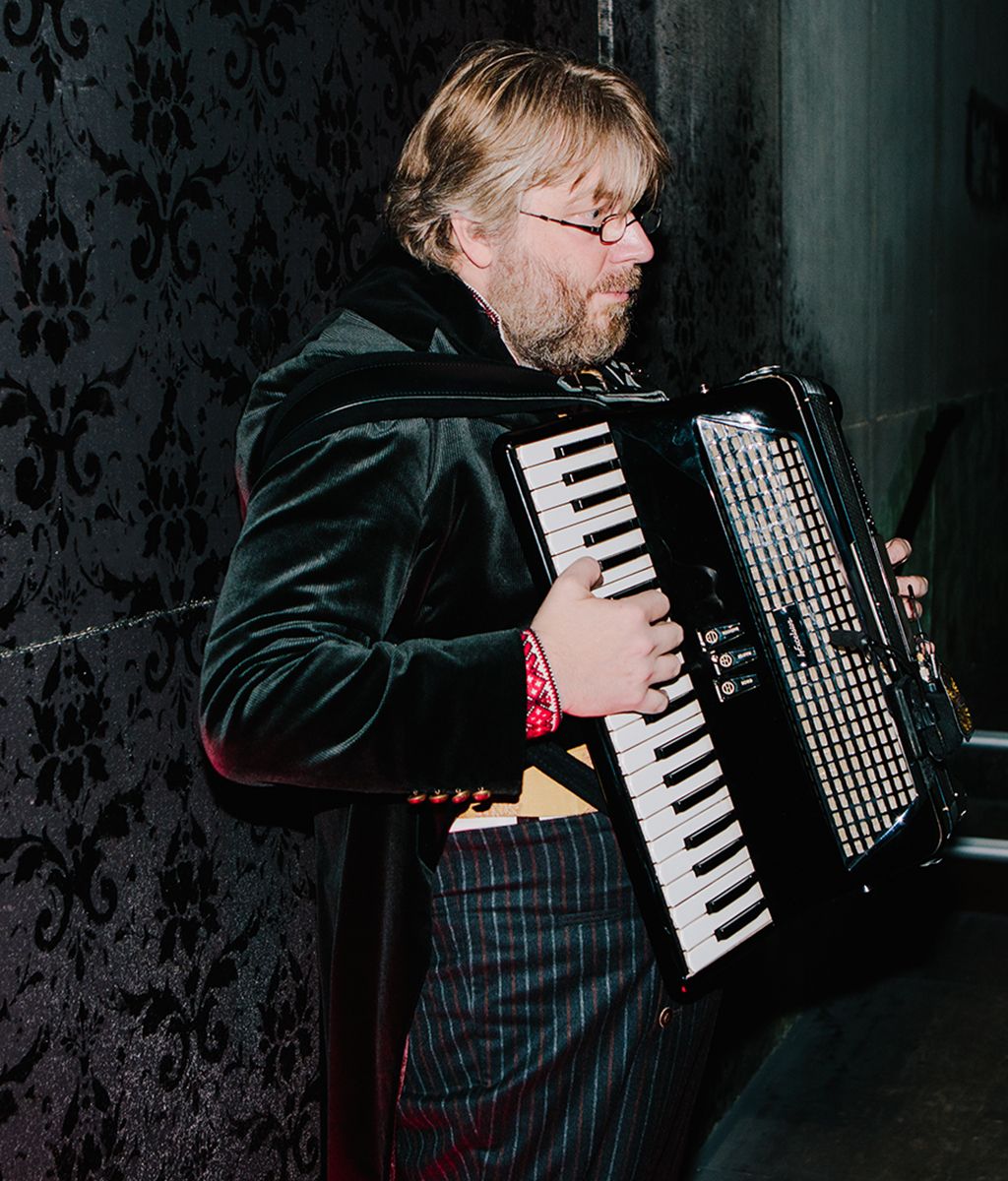Backstage at the Imperial Theatre, Dave Malloy is preparing to play Pierre, a role he has slipped into on and off since 2012, in the musical he started writing a few years before that. There’s a routine. Crew members arrive to tease out his hair and help him into the costume of the awkward protagonist. He slips on an incompletely buttoned yellow vest, straps on an accordion. He drinks tea to preserve his voice and chats with cast members backstage. A Russian-accented announcement goes off in the theater telling the audience to silence their phones. Then Malloy steps onstage, joining the rest of the ensemble in singing, dancing, cheering, and drinking. Natasha, Pierre, and the Great Comet of 1812 will close, three days later, on September 3.
At this point in the show’s run, Malloy wasn’t supposed to be playing Pierre, though the show was never really supposed to make it to Broadway anyway. Born in an 87-seat theater in Ars Nova, the show, an adaptation of a sliver of War & Peace, followed an arcing trajectory to the 1,138-seat Imperial Theatre in the fall of 2016, thanks in large part to director Rachel Chavkin’s immersive vision and a proscenium-breaking set from Mimi Lien. It retained most of its original cast, crew, and creative team, with a few significant tweaks: Josh Groban, for instance, replaced Malloy in the lead role. The Great Comet, an experimental, almost entirely sung-through electro-pop musical about Russian aristocrats, somehow earned 12 Tony nominations and sold lots of tickets. Then it all collapsed.
After Groban’s departure, ticket sales declined. Midway through the summer, the show suddenly announced that it would replace Groban’s replacement — Hamilton’s Okieriete “Oak” Onaodowan, a black actor – with Mandy Patinkin, a famous white actor. Advocates for diversity on Broadway were furious. The producers and creative team apologized, but the damage was done. Patinkin backed out of the role. “Of course he dropped out, I don’t blame him at all,” Malloy says backstage, before the show. “Why would you want to step into that mess?”
With no name big enough to carry it, The Great Comet announced its closing shortly thereafter. So, Malloy is back to shepherd it through its final performances. He is, as it turns out, a great Pierre, with big cumbersome hands and a thoughtful gleam in his eyes — the perfect misfit. He’s not the star the show might have needed, but a compelling presence, in part because of that absence. Malloy, who wears thin-framed glasses and has a Yogi Bear–like enthusiasm, is still trying to level with how everything played out. “In the emotional roller-coaster of the last few weeks,” he says, “the thing I keep coming back to is how absurd it is that I’m standing here at all. It was inevitable it would have to close someday, and so that day came sooner than we had hoped.”
There’s a scene, late in the musical, in which Pierre tells Natasha, the disgraced ingenue, “If I were not myself, but the brightest, handsomest, best man on Earth,” he might declare his love to her. The Great Comet is both a vehicle for and example of that idea — if circumstances were different, we might be heroes. Life being what it is, we make do with what is less than perfect.

Signs of trouble for the show began popping up earlier this summer. After Groban extended his run to early July, the show cast singer-songwriter Ingrid Michaelson as Sonya, replacing Brittain Ashford, a stand-out in the cast, a strategy that helped it keep up ticket sales during the difficult summer months, though perhaps not sustainable long-term. Great Comet needed a way to sell tickets, and big names seemed to work. Onaodowan, a recent star of Hamilton, but not one of its biggest names, was brought on for an eight-week run, originally due to start July 3, the same day as Michaelson, but had his first performance moved back a week. Oak has said, and tweeted, that the show needed time to get ready, while Chavkin and Malloy have said he wasn’t fully prepared to fulfill all the requirements of the role, specifically some portions of his piano and accordion playing, which were cut and given to other performers. “I had to go in for a week because he was unprepared, and he tweeted that we were unprepared,” Malloy says. “That was strange and hard.”
A little over two weeks into Onaodowan’s time onstage, the producers announced that Patinkin would replace him for what was originally the last three weeks of his run, cutting his time onstage to just five weeks. Patinkin’s casting boosted sales, and the producers had hoped he would be able to stay on for longer, depending on his Homeland shooting schedule. “We knew that, to keep the show alive, a name like that could do it,” Malloy says. “If he would have been able to keep us through the holidays, and the holidays would have been great, I think we would still be open, if this had not all happened.”
The decision to replace Onaodowan with Patinkin in the show rankled many who saw it as symptomatic of the industry’s treatment of actors of color. It happened with little notice, and without giving much time for Onaodowan to build buzz, or leave much of a mark, on the role. The blog broadwayblack.com, which broke the news of Onaodowan’s departure, said, “The abrupt replacement of his role to boost ticket sales raises questions about how Black actors are valued and supported.” People involved in the theater community, including Rafael Casal, Cynthia Erivo, Adrienne Warren, tweeted their support for Onaodowan. The phrase “make room for Mandy,” used by lead producer Howard Kagan, became a meme — seemingly indicative of the carelessness with which the decision was made. Just days later, Patinkin stepped out, writing, “My understanding of the show’s request that I step into the show is not as it has been portrayed and I would never accept a role knowing it would harm another actor.”
The team behind The Great Comet was, as a whole, unprepared for the backlash. The show had a record of inclusive casting, bringing on Denée Benton, a black actress, to play the role of a Russian character on Broadway. The creative team had its blind spots, but Malloy described efforts to improve them. A few months into the show’s Broadway run, it had to replace several swings and members of the ensemble, which had been remarkably diverse when it first arrived at the Imperial. Because the demands of those roles were specific — a low bass, or someone who could play the violin — and the hiring was done quickly, The Great Comet ended up picking many white actors. After black cast members on the show pointed out the concern to Malloy and Chavkin, he says they resolved to do better. “We were so excited to have the next round of casting and to keep that value really a priority,” Malloy says. “But we won’t get a chance to do that now.”
Malloy and Chavkin, who were both out of town when Patinkin’s casting was announced, did not see what Malloy later called “the racial optics” of the decision, which he wishes he had considered more thoroughly. In a series of tweets that he sent from Cape Cod that week, Malloy compared it to asking Ashford to leave for Michaelson, noted that sales numbers were grim, and added, “I am not sure the show has a future now.”
“I tweeted that out and immediately threw my phone on the bed and went to the beach for like five hours,” Malloy says of the risky chain of tweets, “because I didn’t even want to see it.” In doing so, he broke one of the unspoken rules of theater by discussing the show’s dire financial state, “something I’m sure our producers would not do because that’s just not a thing you ever want to share.” For Malloy, it seemed like the only way to both respond to accusations against himself and the producers, and clarify that Patinkin’s casting was not a cash grab but a way to ensure survival. “We were trying to make enough money to stay open,” Malloy said. “To see that narrative get painted, and then to have other people amplifying that narrative and then other people not speaking against that narrative when they could have and they themselves knew that that was not a correct narrative — that was all a bit heartbreaking.”
Also distressing to Malloy was that he couldn’t find a good way to answer the demands of those who criticized the show on Twitter. Once Patinkin left, the show’s producers offered the role to Onaodowan, who declined. Reflecting back, Malloy is perplexed by what those who rallied behind Onaodowan were trying to accomplish, since Onaodowan didn’t want the role back once Patinkin left. “I don’t know what their end goal was,” he says, suggesting the possibility that they wanted to close the show. “If their end goal wasn’t to close the show, that means they didn’t realize that what they were doing could close the show, and they didn’t realize the power that they held, and that feels grossly irresponsible to me.”
During that time, Malloy was not in the conversations between the producers and Onaodowan, or Patinkin, about their roles. “I’m kind of on the outside of all those negotiations,” he says. “Yet the show has my name on it, so it’s a weird position to be in.” Malloy says he sent an email to Onaodowan asking to talk in person, who responded over email, but then went radio silent. With Patinkin out, the role of Pierre, and the show as a whole, became poisonous. Other interested actors, including a TV star, according to the Times, backed out. After Patinkin dropped out on July 29, The Great Comet announced its closing on August 8.

As Malloy heads to the stage door before the show, a woman asks if he’ll sign her Great Comet book. She’s seen the musical more than a dozen times, she says, and has been trying to get signatures from the whole cast. After the show announced its closing date, its fans, seemingly more numerous than ever, came out of the woodwork. While the audience who lined up to see Groban in The Great Comet’s early Broadway performances tended to be full of middle-aged women from out of town – a typical and valuable Broadway demographic – in more recent months, the show has drawn a younger fan base, many who, like Malloy, strongly identify with a depressive, introverted character like Pierre. “It has been really cool to kind of reach this younger generation who’s struggling with some of these issues and feel like they are being seen,” Malloy says. “They are seeing themselves.”
The Great Comet’s sales soared in the last week. The line outside the stage door tonight exceeds the length of those seen at Hamilton. The cast put together tribute videos. There are piles of fan mail and gifts collected in the stairwell backstage. Recently, one fan sent a package of pet rocks, individually painted for each cast member, “because they rock.”
As for Malloy, the success of The Great Comet has helped him launch other projects. This October, Malloy’s earlier work, Ghost Quartet, is going up at Next Door at New York Theatre Workshop, with Great Comet actors Gelsey Bell and Brittain Ashford. His next leviathan-sized project is a musical adaptation of Moby-Dick, which has been in the works for the last few years and, in its current form, is nearly five hours long. The show, co-commissioned by the Public Theater and the Berkeley Rep, crosses genres between Broadway musical, vaudeville (for the whaling scenes), jazz cycle (in the story of Pip, a young black sailor who goes overboard), and dream ballet (“where everything goes to hell”). “We’re still talking about whether there will be splash zones or not,” Malloy says. “I mean, we’ve literally talked about ponchos.”
Aside from the chance to once again break apart a classic novel, Moby-Dick also lets Malloy dig into uniquely American themes. He’s interested in the precedent set by Angels in America, another show with a history at the Public and the Berkeley Rep, for ambitious theater that reaches outward at many different ideas. He wants to talk about race, and to acknowledge his limited perspective. Ahab — the “white man, taking this boat, which is America, to its destruction,” which feels especially potent in this political moment, Malloy points out — will be played a white performer, while the rest of the crew of the Pequod will not. “Melville is a white writer and I am a white writer,” he says. “I really want to own that and acknowledge that. I’m writing for this very diverse cast, but my voice is not their voice.”
There may also be a future for The Great Comet. Chavkin and Lien, the show’s set designer, have discussed how to adapt the show’s staging and scenic design for a touring production. If that doesn’t come to pass, the text of the show could eventually be revived as a more literal version with sleighs, snow drifts, and onion domes, or withstand other radical reinterpretations – in a junkyard, or as Malloy jokingly suggests, on the moon. “I can’t wait for high schools to do it,” he says. “I’m excited to go to some high school in Nebraska, to see them with beards on.”
For now, there is this show and this performance. It’s a good night; the audience is full of diehards. They erupt into cheers when Malloy enters, meekly, with his accordion. They laugh at all the jokes, and hold their breaths when it twists into drama.
Backstage, production seems to continue as if the end is not so near. The actors speed up and down the stairs between scenes, stretch, do vocal warm-ups. Some are heading off to a Broadway bowling league game after the show. Malloy is in charge of the production’s Instagram story for the night, and he takes great joy in including cast members in videos. Watching the show on a monitor in the stage manager’s office, a few of the crew members discuss whether, once this is all over, they’ll finally get around to reading War & Peace.
Near the end of the show, The Great Comet sheds much of its extravagance, and what remains is a compressed core of emotion, like a compact star. Natasha and Pierre stand together. Then it is just Pierre, as the comet – a massive chandelier – descends in the center of the theater. Malloy goes into the show’s closing number, “The Great Comet of 1812,” sung toward the comet — a sign of both destruction and change. Some nights, arriving at this moment of catharsis, Malloy thinks about the distance he and and his wife, whom he married in 2014, traversed to met each other. Some nights it’s the future: “terrible accidents and graduations and celebrations and deaths.” Or it’s the sensation of reading the original scene in War & Peace and being moved to tears. “Then, at the last moment,” Malloy says, “I usually imagine the release of death in a really joyful way.”
Death as fulfillment. An ending as a beginning. If that sounds like a complicated idea, Malloy has conveniently expressed it in music and lyrics. As Pierre looks upward, he sings, “It seems to me / That this comet / Feels me / Feels my softened and uplifted soul / And my newly melted heart / Now blossoming into a new life.” The chandelier pulses with more and more light. On the monitor, you can see the faces of everyone in the audience, all looking — for once in the hectic show — in the same direction. There’s another face, too: Malloy’s Pierre, ever imperfect, ever himself, caught in a transcendent moment.
“Fuck,” a crew member says in the silence backstage. “Why are we closing again?”



